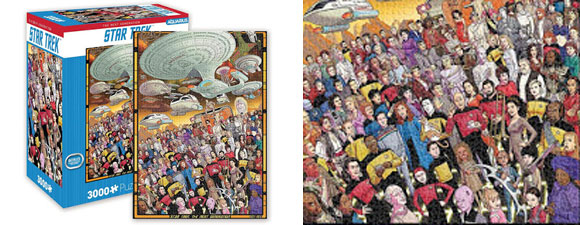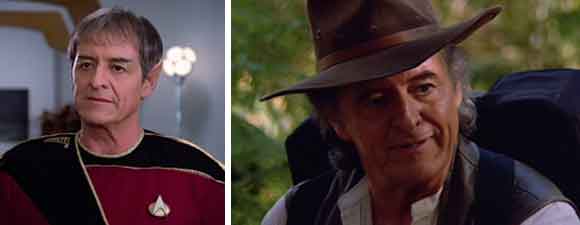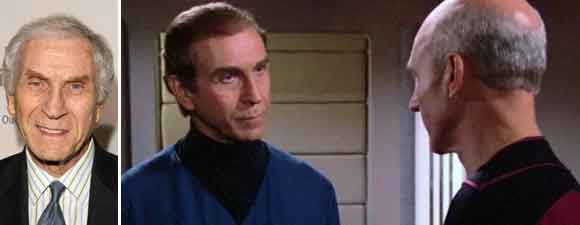Retro Review: Ship in a Bottle
8 min readWhen Data runs his Sherlock Holmes program, he discovers that Moriarty – who became self-aware when the program was first played – now has the ability to exit the holodeck and hold the ship hostage.
Plot Summary: While running the Sherlock Holmes holodeck program, Data and LaForge discover that is has developed glitches. Barclay opens the program’s protected memory and releases James Moriarty, who explains that he has been trapped, fully conscious of where and what he is, in a disembodied state. He demands to speak to Picard, who had promised him that the crew would look into finding a way to free him. Picard visits to explain that the ship’s technology will not permit Moriarty to leave the holodeck, but Moriarty steps through the exit into the Enterprise’s corridor. Crusher’s examination finds that he is a healthy human being. Thrilled to be able to explore the starship, Moriarty asks Picard to recreate Regina Bartholomew, the love of his life. Picard replies that even if he was sure he could bring Regina to life, he wouldn’t believe it to be ethical. Furious, Moriarty diverts the ship’s computer. The crew has been studying two gas giants that are about to collide; without navigational control, their lives are in danger. Picard agrees to try to bring Regina to life, but one of the experiments reveals to Data that the transporter room is simulated. In fact, he, Picard, and Barclay are still within the holodeck, which Moriarty never left. Rather, Moriarty made an exact replica of the ship, though now that he has Picard’s command codes, he can control the real ship too. Picard asks Regina to help him convince Moriarty to return command in return for uncoupling the Heisenberg compensators, which he claims will allow her to leave the holodeck. Moriarty is listening and refuses a deal, instead ordering Riker to uncouple the compensators immediately. He promises to return control of the ship once he and Regina are free. Riker obeys, beaming the couple into the transporter room, then turning over a shuttlecraft to Moriarty. Once the pair have departed, Moriarty relinquishes control of the ship to Picard, who then discontinues the simulation…and the simulation within the simulation. As he tells the crew, the transporter room and shuttle were holographic projections within Moriarty’s holographic Enterprise. Barclay has programmed a lifetime’s worth of experiences for Moriarty and Regina in the small computerized module where they now reside, leaving the real Enterprise once more under Picard’s command.
Analysis: Though Shakespeare quite often gets quoted or mentioned in The Next Generation, “Ship in a Bottle” most makes me think of one of the great speeches, namely Prospero’s near the end of The Tempest (“These our actors/As I foretold you, were all spirits and/Are melted into air, into thin air…”). This is one of the series’ finest episodes, deeply engaged with philosophical and spiritual questions, yet it’s never heavy or pedantic, and for all his agonizing and creating menace, Moriarty is a really fun character who in some ways is easier to relate to than Picard. Since we last saw him in “Elementary, Dear Data,” Moriarty has tried playing by the rules, waiting patiently for the captain to keep his promise and find a way to give him life outside the holodeck. But after several years pass, he quite rightly concludes that Picard has forgotten all about him, and takes matters into his own hands. Even when his character is locked out of the Sherlock Holmes scenario, he can affect it enough to get Data and LaForge’s attention, and once they carelessly turn the problem over to Barclay without even thinking of warning him not to activate the protected memory, the holographic man finally has the means to command Picard’s attention. It’s an absolutely thrilling moment – for Moriarty, for Picard, for the audience – when the former declares, “Cogito ergo sum” and seemingly wills himself into being. When Data takes the first step toward recovering control of the ship by telling Picard that Moriarty isn’t in the real world after all, it’s the saddest moment of the episode, far more than any inconvenient exploding star might become.
The prequel focused heavily on Data, with Moriarty serving as a foil not only for Data’s Holmes but for Data’s existential dilemma, existing as the only artificially created person who can be switched off among people like his creator. Here, though, the focus is entirely on Moriarty, who unlike Data was not developed after years of research by a scientist who grew attached to his creation, but came into being by accident and was quickly forgotten. Picard seems far more impressed by the engineering marvel he believes Moriarty has performed, stepping off the holodeck, than he does by the miracle of sentience, which Moriarty already possessed. The captain is so troubled by the moral issues raised at the prospect of bringing the fictional Regina into the real world that he refuses to consider it until Moriarty leaves him no choice, yet he barely blinks when he finds that Moriarty has apparently endowed the countess with the ability to think for herself as well as comprehensive knowledge about the Enterprise and its place in the universe. Moriarty is smart enough to know that being “real” confers power – freedom of movement, opportunity to learn, capacity to determine one’s own fate – but sentience is what truly matters, even for a being made of particles in flux who’d turn into energy if he left the holodeck. Is it possible he understands, in the end, that he is not in the “real” universe? I think it is, but I’m not sure that would matter so much. He has a universe to explore and the perfect companion. I presume Barclay was smart enough to program in their “deaths” after a reasonable time, so they won’t become suspicious about their longevity. It isn’t altogether different than Picard’s rich and satisfying life as Kamin, lived out in his mind under the control of the probe from “The Inner Light.”
Throughout his adventures, Moriarty speaks with irritation of being a fictional man, which is also his excuse for threatening the Enterprise crew – as a fictional creation, he has far less to lose if he’s caught in a solar explosion, and for all we know he believes that his consciousness will survive even that. Whereas in “Elementary, Dear Data” he appeared to consider the computer that created him as something godlike and Picard as a prophet of sorts, speaking the truth about the limits of his universe, Moriarty has moved beyond a need to understand how or why he exists, and he has no concept of owing anything to any parent or inventor – his own will is sufficient as a reason for being. A friend of mine, a philosophy teacher, pointed out the (likely intentional) connection between Reg Barclay and George Berkeley, the philosopher who proposed that reality is made up not of material objects but of ideas and perceptions. Barclay has often been mocked on and by the show as someone with a dubious grip on reality – things that happen on the holodeck are as real and as important to him as his job and interacting with his crewmates – but here that view of the universe is treated as expertise rather than fanboy silliness, and he’s the one LaForge calls for help with the engineering aspects of the holodeck. And the show goes a step further, ending with Picard pointing out that for all they know, the Enterprise is a “ship in a bottle” too, and everything the crew knows may be an elaborate simulation running in a device somewhere. Most of the senior staff laughs, but Barclay waits until he’s alone and says “End program.” He laughs at himself afterward when his life appears to go on…but then the television episode ends and the screen goes dark, proving the truth of Picard’s joke theory.
I wonder whether this is a difficult episode to watch for someone who hasn’t seen its predecessor – there are references to it both large (the creation of Moriarty via a command to make an adversary capable of defeating Data) and small (the title itself puts me in mind of the model of the HMS Victory that LaForge was painstakingly building in “Elementary, Dear Data”). I watched it with two sons who are somewhat fickle Star Trek fans – capable of appreciating the brilliant episodes, but very willing to scoff at the silly ones – and they not only paid rapt attention but remembered the details of the prequel. What’s most extraordinary about the script for “Ship in a Bottle” is that these enormous philosophical conundrums lead to such witty dialogue and focused action. The episode is itself a bottle show, filmed entirely on standing sets – nobody ever leaves the ship, let alone the ship-within-a-ship – and the external danger seems both vague and unconvincing (two giant planets are going to collide and ignite into a star? Yeah, right). Superb pacing, perfectly timed reveals, the broad range of Moriarty’s emotions, and the sense of wonder infused into the episode primarily by Regina all make the universe outside the ship irrelevant. It’s curious to me that Data doesn’t fight more strongly for Moriarty’s rights, considering that they’re both artificially created intelligences and Moriarty demonstrates far more free will than the exocomps for which Data was willing to sacrifice two crewmembers. Plus Picard seems so limited, even stuffy, lecturing Moriarty about criminal behavior instead of displaying awe at an ego so strong that it pulled itself into existence out of the blackness. Picard assumes Moriarty wants Regina around as a criminal lackey, as if the idea of transcendent love eludes the captain, too. Moriarty is more interesting by far, only criminal because he’s written that way – I root for him even when he’s threatening to let the ship be destroyed, and it’s really the crew’s decision to give him a happy ending that redeems them all.
We are such stuff as dreams are made on, and our little life is rounded with a sleep.






